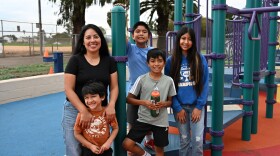Three-year-old Elliot shoots baskets with a toddler-sized hoop at UC San Diego’s Autism Center for Excellence. Elliot has been diagnosed with autism, a developmental disability related to language and social skills.
His mom, Casey Cumpian, said she was not worried about his risk of autism. He was diagnosed after being enrolled in an eye-tracking study at UC San Diego around the age of two.
“We can tell with extremely high precision: Is the baby looking at social images or non-social images? How quickly is the baby moving (their) eyes?” said Karen Pierce, a neuroscientist and co-director of the Autism Center.
Pierce is co-author of a paper in JAMA Network this month that shows children who are less attracted to a parent’s "baby talk" are more likely to have some form of autism. She said eye tracking can identify autism spectrum disorder quickly and accurately.
During the test, Elliot sits on his mother’s lap and looks at a screen that shows two videos simultaneously. One is a video of car traffic and the other shows a woman holding a toy and speaking in baby talk, what researchers call “Motherese.”
“You know that sing-songy, ‘Oh baby I love you. You’re so adorable!’ When you’re around a baby, people have more emotional inflection,” Pierce said. “And when we show the video to kids on the spectrum, they might spend more time looking at the traffic. So remember when Elliot was watching it, he did shift his gaze over to the traffic for a little while, instead of on the mother."
The JAMA Network article described a study where they tested 653 toddlers. It found that if a toddler fixated on the baby talk video at or below 30% of the time, they had a 94% chance of being autistic.
Cumpian said her son has gotten treatment that helps him play with other kids without getting frustrated and is doing great. She said parents should not think it’s shameful if their child is diagnosed with autism.
“People can be a totally normal member of society and have a great life,” Cumpian said.
The Centers for Disease Control estimates by the age of eight, one in 44 U.S. children are found to be on the autism spectrum.








